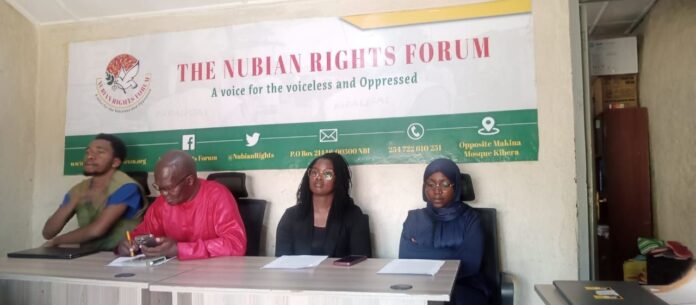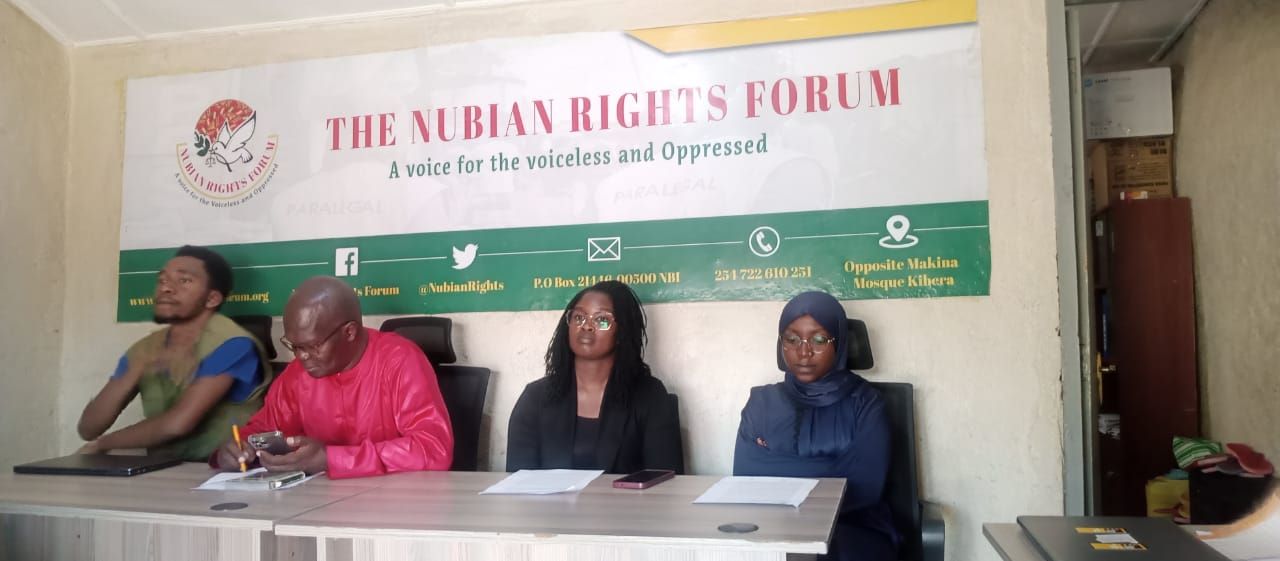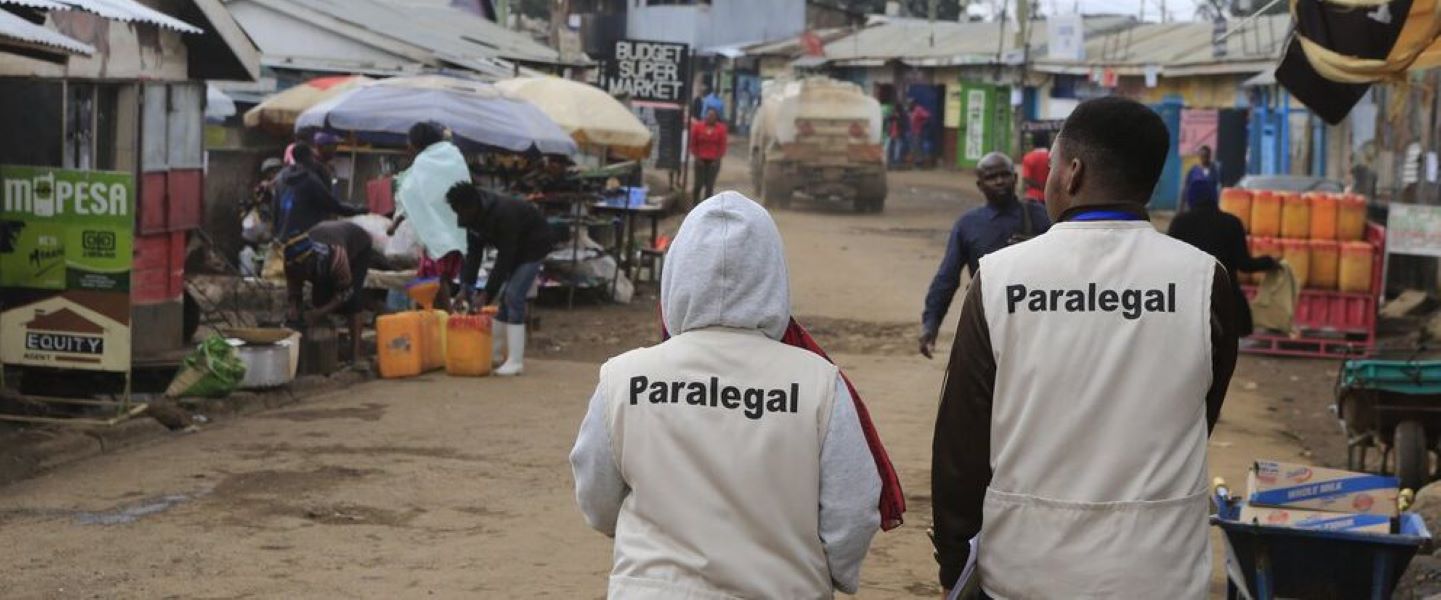
By Henry Owino
Nairobi, Kenya: Nubian Communities living in Kibera, Nairobi Kenya are up in arms against the government for its inequity in the issuance of national identification documents. The community is being forced to pay Ksh 800 instead of Ksh 300 for all Kenyans aged 18 years, the age for acquisition of a national identification card (ID).
Nubians are decrying discrimination in vetting processes, time spent and cost incurred for the acquisition of recognition documents hence delaying access to government and other essential services. All Nubians countrywide are required to part with Ksh 500 extra cost for their vetting processes while the rest of Kenyans pay the new fee of Ksh 300.

Speaking at his office in Kibra, Nairobi, Shafi Ali Husein, Executive Director for the Nubian Rights Forum disclosed that Nubians all over the country are subjected to vetting processes. The procedure takes several months, is very costly to apply, and before receiving national ID cards as though Nubians are non-citizens.
Hussein says the Nubian Rights Forum condemns the Kenya Kwanza Government for arbitrarily increasing fees for national IDs and the coercive approach to the Digital ID System in Kenya. He complained that the current administration is making new regulations drastically that impact the access and issuance of nationality documents without including citizens’ participation.

Hussein recalls just over the past few months, the government not only introduced new charges and increased the cost of acquiring official documents, but is also rushing to implement a new Digital ID System known as Maisha Namba. The new ID system is being hurried yet it is working towards replacing the current second-generation IDs whose cost for replacement in case of loss, is much higher at Ksh 1000.
“The Nubian community is being marginalized and discriminated upon as non-Kenyans on acquisition of vital documents such as national IDs, birth certificates, passports among others. It undermines the community rights to access significant services locally, impossible abroad, and shutter our developments agenda,” Hussein complains.
New payments
The new regulations are seen to disproportionately impact marginalized and minority communities, people living in rural communities, and low-income people. This switch in policy to raise revenue from citizen’s wallets by imposing high fees will lock out many people who simply cannot afford to pay the fees.
For instance, on March 1, 2024, the government announced new fees for official documents including national ID cards, birth certificates, passports death certificates among others. Under the new regulations, ID applications will now pay Ksh 300 (previously free), replacing an ID will cost Ksh 1000 up from Ksh 100, applying for a passport will cost Ksh 7500 up from 4500, and birth certificates cost Ksh 200 up from Ksh 50.
Furthermore, communities subjected to the vetting process will now be forced to pay an additional Ksh 500 fee for document verification leading to further marginalization of already vulnerable communities. This means that individuals from communities such as the Nubians will pay Ksh 800 for a first-time ID applicant. For any replacement of lost ID card to Nubian, it will cost them Ksh 1000.
While comparing the consecutive governments, the Executive Director wondered why the current regime is perpetuating these discriminatory services on the Nubian community. He referred to the Constitution of Kenya 2010, which stipulates every person is equal before the law and has the right to equal protection and equal benefit from the law.
“Article 27(4) specifies; the state shall not discriminate directly or indirectly, against any person on any ground including, rep, sex, religion, wranglers, marital status, health status, ethnic or social’’ Hussein quotes.
“It seems that this government led by William Ruto doesn’t understand how crucial an ID, or birth certificate is for any official participation in society programs. No one should be denied these vital documents just because they cannot afford the fee,” Hussein emphasizes.
Empty promises
The Nubian Rights Forum, alongside other civil society organizations such as Article 19, Katiba Institute, NAMATI, and concerned Kenyans are urging the government to reverse the course, remove the charges, and keep the cost affordable for all. They want to acquire vital and mandatory nationality documents such as IDs or birth certificates to be free or at a minimal fee to ensure ease of affordability and accessibility to all Kenyans.
Meanwhile, Ambassador Julius Bitok, Principal Secretary for the State Department for Immigration and Citizen Services, on 23 February 2024, announced plans to expedite the issuance of the new generation of national ID cards, known as Maisha Cards.
According to Hussein, the decision followed a court order temporarily halting the implementation of the Maisha Namba digital identity project. He says the matter is currently under review by the constitutional and human rights division of the High Court.
Despite assurances that digital identity would remain optional, the government’s decision to cease printing second-generation ID cards compels all Kenyans seeking IDs to enroll in Miasha Namba. The unilateral action threatens to worsen existing inequities, particularly for marginalized communities facing obstacles like vetting to obtain national ID cards.
“The rush to implement Maisha Namba disregards ongoing legal challenges and undermines individuals’ access to essential services. Thousands of Kenyans have already been impacted by the government’s decision to exclusively issue Maisha Cards, resulting in delays and frustration in obtaining identification documents,” Hussein dissents.
External legal support
The Nubian Rights Forum now underscores that Maisha Namba fails to address existing flaws in citizenship processes and discriminatory practices against minority and marginalized communities. Without robust legal frameworks and adequate safeguards, the centralized nature of the Maisha Namba ecosystem raises significant privacy and data protection concerns.
The Nubian Rights Forum calls on the government to reverse its decision to make digital ID mandatory and instead prioritize voluntary enrollment through comprehensive civic engagements.
“We demand the establishment of a robust legal and data protection framework, prioritization of individuals lacking documents, and meaningful inclusion of marginalized communities in the design and implementation of Maisha Namba,” Hussein petitions.
Otherwise, the Executive Director promises to jot a letter to Moussa Faki, the chairperson of the African Union Commission (AUC) to inform him about Kenya’s government’s mistreatment of the Nubian community. He disclosed that Nubians continue to suffer in parts of Kenya; Kibra, Kisii, Kibos, Mathira, and all over the country despite being recognized as citizens.













